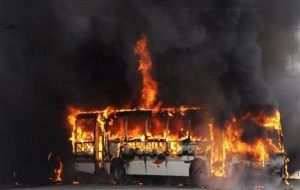MercoPress. South Atlantic News Agency
Killings and riots in Rio do Janeiro; Army patrolled Bahía can't control crime
 Buses set on fire in the highway connecting Niteroi with the hills surrounding Rio
Buses set on fire in the highway connecting Niteroi with the hills surrounding Rio Hooded youngsters blocked one of Rio do Janeiro's main highways connecting with neighboring Niteroi and set on fire several buses and vehicles to protest the killing of two youths during weekend police operations in the shanty town (favela) of Caramujo. To the north in Salvador-Bahía, Brazilian army patrolling is unable to control crime.
One of the youngsters was run over by an armored vehicle from the police while the 21 year old was shot dead when he was preparing to head a Good Friday procession. A sister of the man killed by a police transport was also seriously injured in a cross fire between police officers and drug dealers living in Caramujo.
According to the police report four buses were torched, a small truck, three cars and a motorcycle, all of them in the highway connecting Niteroi with the hills surrounding Rio and in full traffic because of the Easter holiday. Another bus was stoned and people fled in fear while demonstrators mostly hooded youngsters prevented the police access to the Morro de Caixa D'Agua favela.
The Niteroi Archdiocese regretted the death of the young man who was the music animator of religious celebrations of his parish and had gone to the Easter vigil festivity with his mother and sister.
Rio do Janeiro which will host several games of the coming World Cup including the final on July 13, and is expecting tens of thousands of visitors, is desperately trying to address the issue of crime and violence in the many shanty towns that surround the 'marvelous city'.
Last week president Dilma Rousseff on request from Rio governor sent troops to recover control over some of the favelas and ordered the Army to be prepared to move in since many of the local police forces have anticipated they are considering strike actions in demand for better salaries and work conditions.
Meanwhile to the north of the country in Salvador Bahía at least 33 people have been killed since the local police went on strike and the federal government sent troops to patrol the city.
But despite the presence of the Defense minister Jose Eduardo Cardoso, who attributed 'political' motives to the police officers' strike, the number of violent killings in Salvador Bahía has soared 250% over the 2013 average, while four supermarkets were looted, according to Globonews.
“When police demands confront communities and expose citizens to insecurity and a perverse social climate, they can't be labeled legitimate”, claimed Minister Cardoso.
Fuerza Sindical, the second strongest labor union in Brazil announced it is preparing a battery of strikes and stoppages beginning May and during the World Cup, which begins 12 June with the match Brazil-Croatia in Sao Paulo.
“Nobody is against the World Cup but reality is that it helps to give the industrial actions visibility and international repercussion”, said opposition lawmaker Paulo Pereira da Sila, chairman of Fuerza Sindical.
The union organization is planning a major demonstration for 6 June to which it expects support from 479 unions from metal workers, construction laborers and several state police organizations.





Top Comments
Disclaimer & comment rules-

-

-

Read all commentsThe more news I hear from Brazil, the more it sounds like a failed state.
Apr 21st, 2014 - 11:01 am 0My 13 year old neice was robbed at gun-point here in Vitoria ES yesterday.
Apr 21st, 2014 - 11:24 am 0I met her just after. She was pretty traumatised by it.
We can expect the airports and aeroplanes to be striking, so tourists from across the world will not be able to see the matches they have come to see.
Apr 21st, 2014 - 12:09 pm 0That will sink the reputation of Brasil to rock bottom.
It will also cause first world nations to take over the Olympics, because we can't trust the Brasilians to do it.
http://www.economist.com/news/americas/21600983-brazilian-workers-are-gloriously-unproductive-economy-grow-they-must-snap-out?fb_action_ids=10203070869788187&fb_action_types=og.likes&fb_ref=scn%2Ffb_ec%2Fthe_50_year_snooze
Commenting for this story is now closed.
If you have a Facebook account, become a fan and comment on our Facebook Page!